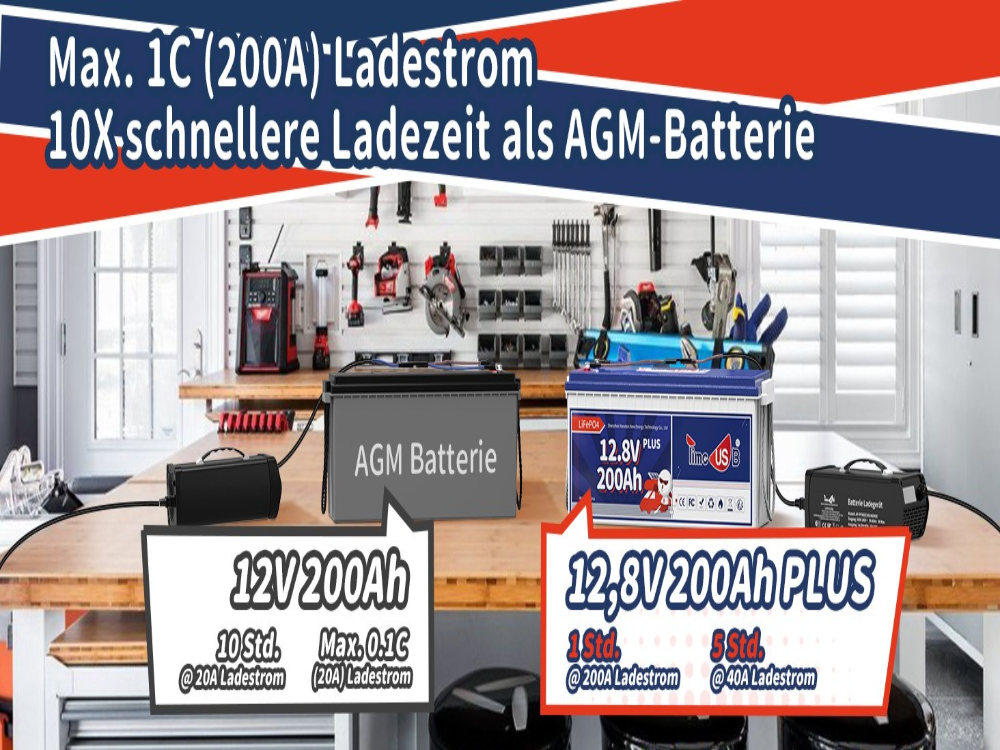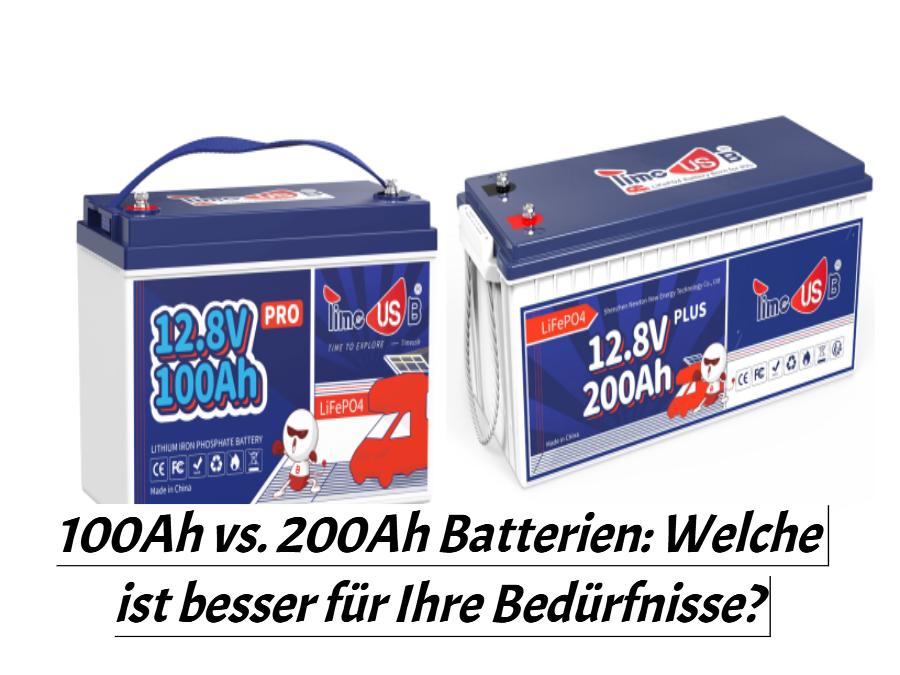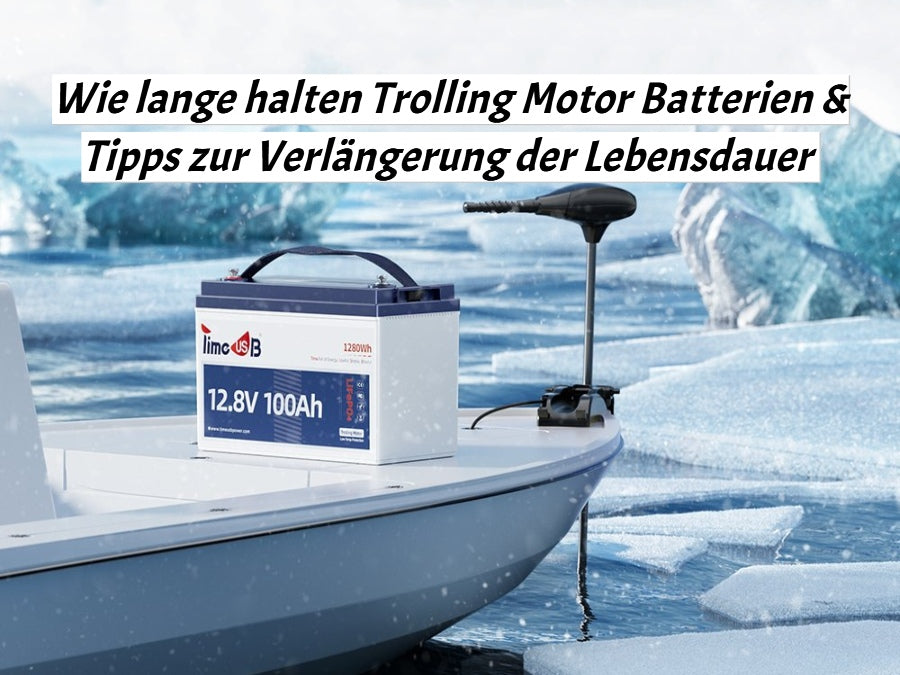AGM vs. Lithium Batteries: Which Is Better for RV and Marine Applications?

In today's modern age, portable power is essential for various applications, so choosing the right battery technology is critical to achieving peak performance, longevity and cost-effectiveness.
Absorbent Glass Mat (AGM) batteries and lithium batteries are excellent options, both valued for their different characteristics and applications. Differentiating between these battery types is essential for making informed decisions.
What is AGM battery?
AGM, the abbreviation for Absorbent Glass Mat, is a more advanced form of lead battery. In contrast to conventional lead batteries, the electrolyte (sulfuric acid) in AGM batteries is embedded in a glass fiber mat, making them leak-proof and maintenance-free.
AGM batteries are commonly used in applications that require reliable, maintenance-free power storage, including backup power systems, renewable energy storage, marine and RV applications, and select automotive applications. AGM batteries are known for their ability to deliver high currents when needed, and are ideal for situations where a reliable power source is of utmost importance.
What is lithium battery?
Lithium battery is a rechargeable energy source that uses lithium as the active material, making it very popular in a wide range of applications. Lithium batteries are known for their high energy density, low self-discharge rates and long cycle life, and can be recharged hundreds to thousands of times. They are available in various chemical compositions, including lithium-ion (Li-ion), lithium polymer (LiPo) and lithium iron phosphate (LiFePO4), each with different properties.
Lithium-ion batteries are widely used in consumer electronics such as smartphones, laptops and tablets, as well as in electric vehicles, power tools and energy storage systems. Their lightweight design and superior energy density make them ideal for portable electronic devices and electric vehicles.
Lithium batteries are valued for their ability to deliver significant power and high energy density, making them the preferred choice in numerous modern applications. However, proper handling and charging are essential to ensure safety and maximize their lifespan.
The comprehensive comparison of AGM and lithium batteries
To understand the performance differences between AGM and lithium batteries, we will evaluate them on critical parameters. This analysis will show which battery is the best in which category and allow you to make an informed decision tailored to your specific needs.
Depth of discharge (DoD):
- AGM: Generally allows a depth of discharge of about 50%. Exceeding this limit can damage the battery and shorten its lifespan.
- Lithium: Supports much deeper discharges, often over 80% and up to 100% without adverse effects. Therefore, a lithium battery of the same capacity can provide up to twice as much usable energy compared to an AGM battery.
Life:
- AGM: AGM batteries typically have a lifespan of about 300 to 500 cycles, which corresponds to a useful life of about 3 to 5 years.
- Lithium: Lithium batteries generally offer a much longer lifespan, with cycle counts ranging from 4,000 to 15,000 cycles. For example, Timeusb lithium batteries can last between 10 and 15 years.
Size and weight:
- AGM: AGM batteries are usually heavy, a 12V 100Ah model weighs between 29 and 31 kg.
- Lithium: Lithium batteries, on the other hand, are much lighter and more compact. Timeusb 12V 100Ah Mini Group24 lithium battery For example, it weighs only 9.5 kg.

Energy density:
- AGM: An AGM Group24 battery typically has an energy density of about 7.23 Wh/lb.
- Lithium: In contrast, a Group24 lithium battery has a significantly higher energy density of about 60.95 Wh/lb.
Charging time and efficiency:
- AGM: AGM batteries typically have longer charging times and lower charging efficiency compared to lithium batteries. It usually takes about 8 hours to fully charge an AGM battery.
- Lithium: In contrast, lithium batteries charge faster and more efficiently than AGM batteries. Most lithium batteries support 0.2C charging; for example, a 12V 100Ah lithium battery can be fully charged in 5-6 hours with a recommended charging current of 20A.
Environmentally friendly:
Both AGM and lithium batteries are recyclable and are environmentally friendly options. However, lithium batteries have a slight advantage due to their higher energy density and longer lifespan, meaning fewer batteries need to be recycled over time.
Security:
- AGM: AGM batteries are generally safe, but can release hydrogen gas if overcharged or improperly maintained.
- Lithium: Lithium-ion batteries do not generate gas buildup or contain toxic liquids, making them inherently safe to use without additional safety precautions. In addition, lithium batteries are protected with a battery management system (BMS) equipped.
Bluetooth technology
Lithium batteries offer a clear technological advantage over AGM batteries. For example, Bluetooth technology allows convenient real-time monitoring of battery status, ensuring smooth operation before boat trips, RV adventures or UTV excursions.
Bluetooth connectivity allows users to effortlessly monitor important details such as remaining charge, voltage levels and temperature. The app on your smartphone allows easy access to comprehensive battery data with just a few taps, eliminating guesswork and uncertainty and taking the worry out of managing power needs.
acquisition costs
Cost plays a crucial role in choosing between two battery types, with two critical factors being the focus: acquisition cost and cost per kWh.
Lithium-ion batteries require a higher initial investment. Despite their superior performance in many ways compared to AGM batteries, the initial costs are significantly higher.
AGM batteries seem to be the more economical choice in terms of initial investment. However, when evaluating lifetime costs, lithium-ion batteries show their superiority due to their significantly longer lifespan.
| aspect | AGM battery | lithium battery |
| depth of discharge | Normally about 50% | Over 80%, up to 100% without damage |
| life | 300-500 cycles, 3-5 years | 4000-15000 cycles, 10-15 years |
| size and weight | Heavier, 12V 100Ah: 63–70 pounds | Lighter, 12V 100Ah: 21 pounds |
| energy density | 7.23Wh/pound | 6 times as powerful as comparable lead batteries |
| charging time | Longer loading times | Shorter loading times |
| charging efficiency | Lower charging efficiency | Higher charging efficiency |
| maintenance | Minimal maintenance, occasional balancing charging | Minimal maintenance effort, no regular balancing charges |
| environmental pollution | Recyclable, less environmentally friendly due to energy density and shorter lifespan | Recyclable, more environmentally friendly due to energy density and longer service life |
| Security | Generally safe, possible release of hydrogen gas in case of overcharging | Safer, no gas release, equipped with BMS for protection |
| Bluetooth | No | Yes |
| acquisition costs | Lower | Higher |
Comparison of AGM and lithium battery applications
After evaluating the performance of AGM and lithium batteries based on various parameters, it is important to assess their suitability for specific applications.
Not all batteries are universally suitable, and certain models may excel in certain scenarios. Let's dive into the specific applications that AGM and lithium batteries are ideal for:
leisure batteries
When choosing leisure batteries for your RV or caravan, LFP batteries are highly recommended. In the RV battery market, consumers value factors such as long life, safety and minimal maintenance. Lithium leisure batteries, particularly those using lithium iron phosphate (LFP) technology, meet these criteria extremely well. For RVs with integrated lithium batteries, dedicated battery chargers are preferable to built-in chargers to ensure optimal performance.
naval batteries
Traditional liquid or gel batteries are not ideal for marine use due to their sensitivity to motion, which can affect their effectiveness. In contrast, most lithium batteries are solid-state and do not contain any liquids, making them very suitable for marine use.In addition, modern lithium batteries for marine use such as the Timeusb Trolling Motor Battery series (12V 140Ah LiFePO4 battery) are equipped with improved battery management systems (BMS) specifically designed for marine use. These systems increase reliability by providing resistance to moisture, dust, water and salt mist, ensuring a long service life in humid and difficult conditions.

freezing conditions
Using batteries in freezing conditions presents a challenge, especially when charging, which can be difficult at low temperatures. AGM batteries are superior to lithium batteries in this regard.
However, advanced lithium batteries such as the Timeusb LFP Lithium batteries have a self-heating function. This ability allows them to function similarly to AGM batteries even at sub-zero temperatures.
solar energy storage
Lithium iron phosphate batteries are ideal for solar energy storage due to their high energy density, deep discharge capability and extended warranty. A single AGM battery may have a lower initial cost, but can deliver the power of 16 AGM batteries over its lifetime. Therefore, LFP batteries are the better choice for solar storage applications.
UPS battery
Similar to the RV battery market, the uninterruptible power supply (UPS) market also favors LFP (lithium iron phosphate) batteries. They offer greater safety, require minimal maintenance, and offer higher capacity compared to equivalent AGM batteries, making them a more convenient long-term choice for ownership.
The final decision
When comparing lithium and AGM batteries, both have unique advantages and disadvantages. However, if you prefer a reliable, efficient and lightweight maintenance-free solution, the optimal choice becomes clear. Lithium batteries prove to be the best option for your application. Their improved performance, longer lifespan and integrated Bluetooth technology provide significant comfort and convenience. Moreover, they can ultimately save you valuable time and money.




